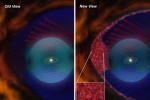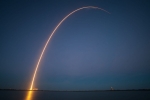Collapse Of The Universe Could Happen Sooner Than We Thought, Or Not At All

Well, there's good news, and there's bad news. The bad news is that the universe could be collapsing upon itself as we speak, condensing all matter into the densest and heaviest ball of all time. The good news, is that researchers could be completely wrong.
Danish physicists recently set out to determine through mathematical calculations whether the universe will ever go through what's known as a "phase transition," and if so, how soon that might happen. The phase transition is something like liquid water boiling into vapor, and it could be caused when the Higgs field (an energy field spread throughout the universe which endows particles with mass) loses energy. What they found, and published in the Journal of High Energy Physics, is that the probability of this ever happening is greater than scientists thought.
Like Us on Facebook
"The phase transition will start somewhere in the universe and spread from there," Jens Frederik Colding Krog, a doctoral student at the University of Southern Denmark and co-author of the paper, said in a news release. "Maybe the collapse has already started somewhere in the universe, and right now it is eating its way into the rest of the universe. Maybe a collapse is starting right now, right here. Or maybe it will start far away from here in a billion years. We do not know."
There's more they don't know. The thing about working with particles such as the Higgs Boson is that we don't have a full inventory of them yet. Scientists discovered Higgs in March 2013, and a lot of people think there are more like it that could have all kinds of effects on calculations about the expansion or collapse of the universe. "If the universe contains undiscovered particles," the university says, "the whole basis for the prediction of phase change disappears." There would be no collapse.
For all the uncertainty, we do know for sure that the fate of the universe will be one of two things: eternal expansion or inevitable collapse. According to NASA, whichever it is relies completely on density. There's an alternate theory out there called the "Big Crunch." It's the opposite of the Big Bang, based on everything quickly packing into a tiny spot, and then exploding. In the Big Crunch, everything returns like a deflated balloon. "If the density of the universe is less than the 'critical density' ... then the universe will expand forever," NASA says. "If the density of the universe is greater than the 'critical density,' then gravity will eventually win and the universe will collapse back on itself."
The phase transition scenario described by Colding Krog would play out pretty violently. At the epicenter of the change, a bubble will form and expand at the speed of light. Every particle of matter caught in the bubble would become heavier by a few million billion times, causing everything — absolutely everything — to crumple into the hottest, hardest, heaviest little ball. This could happen at any time, Colding Krog says. Meanwhile, the Big Crunch, according to the Stanford physicists who developed the theory, would probably happen in 10 to 20 billion years.
© 2012 iScience Times All rights reserved. Do not reproduce without permission.

25 Year Study Reveals Eco-Farming To Be Economically Feasible And Sustainable

How Methane-Producing Microbes Caused The Largest Mass Extinction The World Has Ever Seen

Terrifying Animatronic Robot Dances To 'Blurred Lines,' Causes Nightmares [VIDEO]

Scientists Demonstrate Three-Way Quantum Communication: What's Faster Than The Speed Of Light?

Woolly Mammoth DNA To Be Cloned, Then Joined With Elephant DNA To Create New Creature

Oculus Rift Headset Will Take You On A Trip To Space, All From The Comfort Of Your Couch



![How to Turn Your Tap Water Faucet Into a Coffee Spout [VIDEO]](../../../cdn-sub/data/thumb/mainpage/6005-150100-coffee.jpg)

